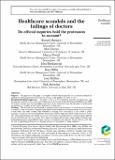Files in this item
Healthcare scandals and the failings of doctors : do official inquiries hold the profession to account?
Item metadata
| dc.contributor.author | Mannion, Russell | |
| dc.contributor.author | Davies, Huw | |
| dc.contributor.author | Powell, Martin | |
| dc.contributor.author | Blenkinsopp, John | |
| dc.contributor.author | Millar, Ross | |
| dc.contributor.author | McHale, Jean | |
| dc.contributor.author | Snowden, Nick | |
| dc.date.accessioned | 2019-03-05T12:30:09Z | |
| dc.date.available | 2019-03-05T12:30:09Z | |
| dc.date.issued | 2019-03-28 | |
| dc.identifier | 257794305 | |
| dc.identifier | f4345904-9196-4721-8a3c-bd9d9b39ed39 | |
| dc.identifier | 85062441713 | |
| dc.identifier | 000463633800007 | |
| dc.identifier.citation | Mannion , R , Davies , H , Powell , M , Blenkinsopp , J , Millar , R , McHale , J & Snowden , N 2019 , ' Healthcare scandals and the failings of doctors : do official inquiries hold the profession to account? ' , Journal of Health Organization and Management , vol. 33 , no. 2 , pp. 221-240 . https://doi.org/10.1108/JHOM-04-2018-0126 | en |
| dc.identifier.issn | 1477-7266 | |
| dc.identifier.other | ORCID: /0000-0002-2653-3695/work/57821620 | |
| dc.identifier.uri | https://hdl.handle.net/10023/17214 | |
| dc.description | The research was funded by the National Institute for Health Research (NIHR) Health Services and Delivery Research (HS&DR) programme. | en |
| dc.description.abstract | Purpose – The purpose of this paper is to explore whether official inquiries are an effective method for holding the medical profession to account for failings in the quality and safety of care. Design/methodology/approach – Through a review of the theoretical literature on professions and documentary analysis of key public inquiry documents and reports in the UK National Health Service (NHS) the authors examine how the misconduct of doctors can be understood using the metaphor of professional wrongdoing as a product of bad apples, bad barrels or bad cellars. Findings – The wrongdoing literature tends to present an uncritical assumption of increasing sophistication in analysis, as the focus moves from bad apples (individuals) to bad barrels (organisations) and more latterly to bad cellars (the wider system). This evolution in thinking about wrongdoing is also visible in public inquiries, as analysis and recommendations increasingly tend to emphasise cultural and systematic issues. Yet, while organisational and systemic factors are undoubtedly important, there is a need to keep in sight the role of individuals, for two key reasons. First, there is growing evidence that a small number of doctors may be disproportionately responsible for large numbers of complaints and concerns. Second, there is a risk that the role of individual professionals in drawing attention to wrongdoing is being neglected. Originality/value - To the best of the authors’ knowledge this is the first theoretical and empirical study specifically exploring the role of NHS inquiries in holding the medical profession to account for failings in professional practice. | |
| dc.format.extent | 209512 | |
| dc.language.iso | eng | |
| dc.relation.ispartof | Journal of Health Organization and Management | en |
| dc.subject | Sociology | en |
| dc.subject | Doctors | en |
| dc.subject | Medical professions | en |
| dc.subject | Safety | en |
| dc.subject | Quality | en |
| dc.subject | HM Sociology | en |
| dc.subject | HD28 Management. Industrial Management | en |
| dc.subject | RA Public aspects of medicine | en |
| dc.subject | T-NDAS | en |
| dc.subject.lcc | HM | en |
| dc.subject.lcc | HD28 | en |
| dc.subject.lcc | RA | en |
| dc.title | Healthcare scandals and the failings of doctors : do official inquiries hold the profession to account? | en |
| dc.type | Journal article | en |
| dc.contributor.institution | University of St Andrews. School of Management | en |
| dc.identifier.doi | 10.1108/JHOM-04-2018-0126 | |
| dc.description.status | Peer reviewed | en |
This item appears in the following Collection(s)
Items in the St Andrews Research Repository are protected by copyright, with all rights reserved, unless otherwise indicated.

